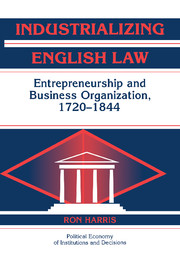Book contents
- Frontmatter
- Contents
- List of Tables
- Acknowledgements
- Introduction
- 1 The Legal Framework
- PART I BEFORE 1720
- PART II 1721–1810
- PART III 1800–1844
- 8 The Attitudes of the Business Community
- 9 The Joint-Stock Company in Court
- 10 The Joint-Stock Company in Parliament
- Conclusion
- Appendix 1 The Rise and Decline of the Major Trading Corporations
- Appendix 2: Capital of Joint-Stock Companies Circa 1810
- Bibliography
- Index of Cases
- Index of Statutes
- General Index
9 - The Joint-Stock Company in Court
Published online by Cambridge University Press: 12 August 2009
- Frontmatter
- Contents
- List of Tables
- Acknowledgements
- Introduction
- 1 The Legal Framework
- PART I BEFORE 1720
- PART II 1721–1810
- PART III 1800–1844
- 8 The Attitudes of the Business Community
- 9 The Joint-Stock Company in Court
- 10 The Joint-Stock Company in Parliament
- Conclusion
- Appendix 1 The Rise and Decline of the Major Trading Corporations
- Appendix 2: Capital of Joint-Stock Companies Circa 1810
- Bibliography
- Index of Cases
- Index of Statutes
- General Index
Summary
Chapter 3 left the history of the Bubble Act shortly after its enactment in 1720. Chapter 6 described the difficulties that the unincorporated company faced during the eighteenth century in common law and in equity, with only a glimpse at the Bubble Act. It is now time to combine the two stories, as, in 1808, the unincorporated company and the act meet in court for the first time since 1721. I argue in this chapter that this first meeting, and the frequent litigation that followed, turned the courts into a major playing field between 1808 and 1844. Though the only form of organization disputed was the unincorporated company, results of the litigation eventually had a considerable affect on the fate of the business corporation as well. This judicial playing field also greatly affected a parallel field: Parliament. The two major pieces of legislation of this period, the repeal of the Bubble Act in 1825 and the General Incorporation Act of 1844 (which are discussed in Chapter 10) were a reaction to dramatic shifts in judge-made law. They cannot be understood without a full account of their judicial context. This context includes judge-made doctrine produced in a stream of formal court decisions. These decisions, in turn, cannot be understood without an awareness of the institutions in which they were given – the courts – and the personages that shaped them – the judges.
- Type
- Chapter
- Information
- Industrializing English LawEntrepreneurship and Business Organization, 1720–1844, pp. 230 - 249Publisher: Cambridge University PressPrint publication year: 2000

